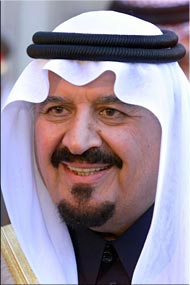RIYADH, 9 March 2003 — Prince Sultan, second deputy premier and minister of defense and aviation, received the 2003 King Faisal International Prize for Service to Islam awarded to Prince Sultan Charitable Foundation of Riyadh here yesterday.
Prince Khaled Al-Faisal, governor of Asir and director-general of King Faisal Foundation, presented the award to Prince Sultan at a ceremony held at the conference hall of Al-Faisaliah Hotel attended by a distinguished gathering of members of the royal family, Cabinet ministers, diplomats and other invited guests.
One of the highlights of the event was a documentary marking the 25th anniversary of the King Faisal International Prize. A total of 161 laureates from 37 countries from all continents won the international prize exemplifying Islamic heritage, Arab intellect and Saudi values. Prince Khaled referred to this aspect in his speech when he underlined the international dimension of KFIP.
Professor Ezz El-Din Omar Mousa of Sudan and Dr. Ibrahim Abubakar Harakat of Morocco were named co-winners of King Faisal International Prize for Islamic Studies. Other prize winners were: Professor Axel Ullrich of Germany’s Max-Planck Institute for Biochemistry and Professor Umberto Veronisi of the European Institute of Oncology in Milan (Italy) who shared the Medicine Prize for their work on breast cancer.
In the science category (chemistry), Professor Marion Frederick Hawthorne of the University of California shared the prize with Professor Koji Nakanishi of New York’s Columbia University. The award for Arabic literature was withheld. All the prize winners received the awards from Prince Sultan on behalf of Custodian of the Two Holy Mosques King Fahd.
The cumulative value of the awards is SR3.75 million ($1 million), with each winner receiving $200,000 in cash in addition to 200-gram, 22-carat gold medallion, and a citation.
Dr. Abdullah Al-Othaimeen, secretary-general of King Faisal International Prize (KFIP), said Prince Sultan ibn Abdul Aziz Foundation was nominated for the award by King Khaled University, Abha, and the World Assembly of Muslim Youth (WAMY), Riyadh.
He said it has been honored for its outstanding achievements, including the provision of social services and health care for the elderly and comprehensive rehabilitation programs for the disabled, in addition to several major housing, educational and medical programs.
In his acceptance speech, Professor Ezz El-Din Omar Mousa, co-winner of King Faisal International Prize for Islamic Studies, paid tributes to his parents and Islamic scholar Sheikh Hamad Al-Jasir for inspiring the launch of his award-winning work on the economic life in Morocco during the sixth century A.H.
The other co-winner of the award for Islamic studies, Professor Ibrahim Abubakr Harakat, in his acceptance speech said the selection of the history of Islamic economics as the topic of this year’s prize for Islamic studies underlines one of the most important aspects of Islamic history that had its impact on other nations during the earlier eras of Islamic civilization.
Professor Umberto Veronesi was named the co-winner of the King Faisal International Prize for Medicine (breast cancer) along with Professor Axel Ullrich of Germany. In his acceptance speech, Professor Veronesi, scientific director of the European Institute of Oncology, said the presentation of the award testifies to its international character irrespective of race, color or sex. “We are aware of the fundamental contribution of Arab scholars during the ‘Dark Ages’ in Europe,” he said.
The other co-winner of King Faisal International Prize for Medicine, Professor Axel Ullrich said the scientific work for which he had been honored began more than 25 years ago in California. Since then, it involved large numbers of people who helped translate ideas into scientific success and medical application.
In the science (chemistry) category, Professor M. Frederick Hawthorne, who teaches at the University of California, won the award jointly with Professor Koji Nakanishi of Japan. Professor Frederick was honored in recognition of his outstanding achievements in the field of boron chemistry and its importance in terms of cancer therapy.
He said “the opportunity to participate in the 2003 King Faisal Prize is much more than an academic honor for me. This occasion fulfills my long-awaited wish to visit Saudi Arabia to learn more about its culture, religion and ongoing projects in science, particularly in chemistry.”
In his acceptance speech, Professor Nakanishi said he learned of the award by chance during a train journey, when he read about the announcement in a newspaper. He thanked the King Faisal Foundation for the honor conferred on him.


